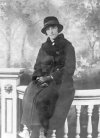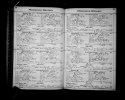-
Welcome to this forum . We are a worldwide group with a common interest in Birmingham and its history. While here, please follow a few simple rules. We ask that you respect other members, thank those who have helped you and please keep your contributions on-topic with the thread.
We do hope you enjoy your visit. BHF Admin Team
You are using an out of date browser. It may not display this or other websites correctly.
You should upgrade or use an alternative browser.
You should upgrade or use an alternative browser.
Brummies who moved to the USA
- Thread starter Stokkie
- Start date
ChrisM
Gone but not forgotten R.I.P
I'm really grateful to you, MWS and Janice, for picking up the baton and providing all that information about my great-aunt, Mary Bannister/Wilson/Semon. Up to now she had just been a name on a family tree and a few family notes and now I know far more. I wonder if my father remembered her from early childhood - he was just four when she disappeared from his family home in Summer Lane at the age of 21. But he took the trouble to seek her out when he was in the USA in 1935. I have been trying to recall family Christmas cards my parents used to receive, during the war and a bit later. There were one or two from the USA - definitely including people who shared his table on the Queen Mary in 1938 (a Mrs. Schwarz I remember especially) - but "from Mary" unfortunately draws a blank.
You are right - this needs a separate thread, for various reasons. I'll create one shortly and provide the link here.
Chris
PS Just unearthed another family photograph - a studio image of Mary during her time in the USA. 1920s perhaps.

You are right - this needs a separate thread, for various reasons. I'll create one shortly and provide the link here.
Chris
PS Just unearthed another family photograph - a studio image of Mary during her time in the USA. 1920s perhaps.

Last edited:
Richard Dye
master brummie
She looks quite well!I'm really grateful to you, MWS and Janice, for picking up the baton and providing all that information about my great-aunt, Mary Bannister/Wilson/Semon. Up to now she had just been a name on a family tree and a few family notes and now I know far more. I wonder if my father remembered her from early childhood - he was just four when she disappeared from his family home in Summer Lane at the age of 21. But he took the trouble to seek her out when he was in the USA in 1935. I have been trying to recall family Christmas cards my parents used to receive, during the war and a bit later. There were one or two from the USA - definitely including people who shared his table on the Queen Mary in 1938 (a Mrs. Schwarz I remember especially) - but "from Mary" unfortunately draws a blank.
You are right - this needs a separate thread, for various reasons. I'll create one shortly and provide the link here.
Chris
PS Just unearthed another family photograph - a studio image of Mary during her time in the USA. 1920s perhaps.
View attachment 208387
hi chris i am sure we have members happy to help you with mary bannister...looking back on this thread i think you need to move all the posts from post 114 to your new thread..just pop it under surname interests..i will also try to help but i am not as good as some of our members are...fingers crossed
lyn
lyn
ChrisM
Gone but not forgotten R.I.P
Have started a new thread here:
https://birminghamhistory.co.uk/forum/threads/bannister-mary-and-martha.59443
It is a re-write, including the information generously supplied here by MWS and Janice who have already added so much to my knowledge of what happened. Have left this thread intact because I didn't want to risk moving - and possibly losing - some of the valuable contributions made.
If any other member wants to make a comment on this little family saga in the future, could you go to the new thread please.
Thanks for all the interest.
Chris
https://birminghamhistory.co.uk/forum/threads/bannister-mary-and-martha.59443
It is a re-write, including the information generously supplied here by MWS and Janice who have already added so much to my knowledge of what happened. Have left this thread intact because I didn't want to risk moving - and possibly losing - some of the valuable contributions made.
If any other member wants to make a comment on this little family saga in the future, could you go to the new thread please.
Thanks for all the interest.
Chris
Richard last looked at the forum Jan 2nd. But he last posted 23rd Nov. I hope he is ok.It seems to me that our friend Richard Dye has not posted since November. I hope I am wrong.
Does anyone have any news ?
just to inform you all that richard is quite well and has been conversing with myself via private message..however richard has over time had a problem within this forum which made him feel that he just did not want to continue posting (something no member of this forum should be made to feel they have to do by someone else) moderators will be discussing this issue and will decide how best to go forward...in the meantime richard will remain a valued member and is free to post as and when he feels he wants to...thank you for your concern
the team
the team
Last edited:

